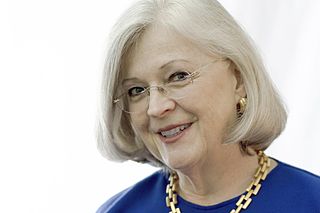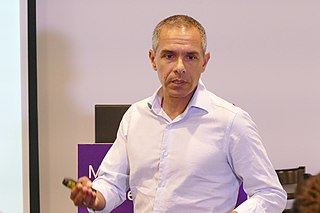Related Research Articles
In economics, internationalization or internationalisation is the process of increasing involvement of enterprises in international markets, although there is no agreed definition of internationalization. Internationalization is a crucial strategy not only for companies that seek horizontal integration globally but also for countries that addresses the sustainability of its development in different manufacturing as well as service sectors especially in higher education which is a very important context that needs internationalization to bridge the gap between different cultures and countries. There are several internationalization theories which try to explain why there are international activities.
International business refers to the trade of goods, services, technology, capital and/or knowledge across national borders and at a global or transnational scale.
John Harry Dunning was a British economist and is widely recognised as the father of the field of international business. He researched the economics of international direct investment and the multinational enterprise from the 1950s until his death. In the 1980s, he published the eclectic paradigm or OLI-Model/Framework as further development on Internalization theory. OLI remains the predominant theoretical perspective to study international business activities, notably foreign direct investment and multinational enterprises. His first book, American Investment in British Manufacturing Industry (1958), is the first seminal work in the international business field.
Geir Gripsrud is a Norwegian organizational theorist and Professor of Marketing at BI Norwegian Business School in Oslo, known for his work on international marketing, market entry strategy and distribution channels.
Rajneesh Narula, is an economist and academic. He is Professor of International Business Regulation and Director of the John H. Dunning Center for International Business at Henley Business School, University of Reading in Reading, UK.
Alan M. Rugman (1945-2014) was a leading scholar in the field of international business. In his last academic role, he served as Head of International Business and Strategy at Henley Business School, University of Reading in Reading, UK.
Internalization theory is a branch of economics that is used to analyse international business behaviour. Internalization theory focuses on imperfections in intermediate product markets. Two main kinds of intermediate product are distinguished: knowledge flows linking research and development (R&D) to production, and flows of components and raw materials from an upstream production facility to a downstream one. Most applications of the theory focus on knowledge flow. Proprietary knowledge is easier to appropriate when intellectual property rights such as patents and trademarks are weak. Even with strong protections firms protect their knowledge through secrecy. Instead of licensing their knowledge to independent local producers, firms exploit it themselves in their own production facilities. In effect, they internalise the market in knowledge within the firm. The theory claims the internalization leads to larger, more multinational enterprises, because knowledge is a public good. Development of a new technology is concentrated within the firm and the knowledge then transferred to other facilities.
The Reading School of International Business is widely understood in the field of international business (IB), management and economics to embody a stream of conceptual, and theoretically-driven empirical research, and consists of a group of economists that have a common approach to analyzing multinational enterprise and foreign direct investment. Some are based in the Department of Economics and in Henley Business School at the University of Reading, England, but membership is international. The Reading School builds upon the pathbreaking theoretical work of Peter Buckley and Mark Casson on internalization theory. This was complemented by simultaneous work by John Dunning as he developed the eclectic paradigm of international business as an envelope explanation containing three principal drivers of foreign direct investment, comprising ownership (O); location (L); and internalization (I). The Reading School approach continues through the work of its academic disciples around the world, as well as through The John Dunning Centre at Henley Business School, University of Reading, under the directorship of Rajneesh Narula.
Sidney John Gray PhD FASSA FCCA CPA MCMI is an English professor of International Business at the University of Sydney Business School, was President of the International Association for Accounting Education and Research (1992–97), a member of the Accounting Standards Committee (ASC) for the UK and Ireland (1984–87) and is recognised ‘as one of the world's leading scholars in international accounting’. Gray has been a visiting professor in many universities around the world including the University of Amsterdam, Stockholm School of Economics, Kyushu University, University of Hong Kong, Waseda University, National University of Singapore, University of Malaya, University of Hawaii and Kwansei Gakuin University in Japan.
Sven A. Haugland is a Norwegian organizational theorist and Professor of industrial marketing and strategy at the Norwegian School of Economics, known for his work on marketing in the service industry, and measuring Strategic alliance performance.
Randi Lunnan is a Norwegian organizational theorist, and Professor at the Department of Strategy of the BI Norwegian Business School, known for her work on international strategic alliances and management of international corporations.
Reijo Kalevi Luostarinen was a Finnish organisational theorist, Professor of International Business at the Aalto University School of Business, and chairman of Biohit. He is known for his work on internationalization and International business operations.
Lawrence S. Welch is an Australian organisational theorist, Professor of International Business at the Melbourne Business School, known for his work on internationalization and international business operations.

Lorraine Eden is Professor Emerita of Management in the Mays Business School of Texas A&M University, College Station, Texas. She also holds a joint appointment as a research professor in the Texas A&M School of Law. Dr. Eden is an expert in the field of International Transfer Pricing, which is the pricing of products that move between subunits of Multinational Enterprises (MNEs).
The springboard theory or springboard perspective is an international business theory that elucidates the unique motives, processes and behaviors of international expansion of emerging market multinational enterprises. Springboard theory was developed by Luo and Tung (2007), and has since been used to examine EM MNEs. At the core of this theory is the argument that EM MNEs systematically and recursively use international expansion as a springboard to acquire critical resources needed to compete more effectively against their global rivals at home and abroad and to reduce their vulnerability to institutional and market constraints at home. These efforts are systematic in the sense that “springboard” steps are deliberately designed as a grand plan to facilitate firm growth and as a long-range strategy to establish more solidly their competitive positions in the global marketplace. They are also recursive because such “springboard” activities are recurrent and revolving.
Co-opetition or coopetition – simultaneous competition and cooperation – is an important philosophy or strategy that goes beyond the conventional rules of competition and cooperation to achieve advantages of both. Global co-opetition, an application of co-opetition in a global context, is first systematically addressed in Luo’s (2004) book “Coopetition in international business”. According to this book, global co-opetition refers to the simultaneous competition and cooperation between multinational enterprises (MNEs) and their geographically dispersed business stakeholders such as global rivals, global suppliers, global distributors, global alliance partners, and foreign governments as well as among foreign subsidiaries within an MNE.
Thomas Hutzschenreuter is a German economist. He holds the chair of strategic and international management at the TUM School of Management.
Mira Wilkins is an American economic and business historian and a world authority on the history of American business and foreign direct investment. She is Professor Emerita at the Department of Economics, Florida International University.

Niron Hashai is an Israeli business scholar. He is a professor of strategy and international business, and the dean of the Arison School of Business at Reichman University.

Anil K. Gupta is an American academic specializing in business strategy. He holds the Michael D. Dingman Chair in Strategy, Globalization, and Entrepreneurship at University of Maryland’s Robert H. Smith School of Business.
References
- ↑ Gabriel R G Benito Archived 2013-11-12 at the Wayback Machine at bi.edu
- ↑ Caves, Richard E. Multinational enterprise and economic analysis. Cambridge university press, 1996.
- ↑ EIBA Annual Conferences at eiba-online.org
- ↑ "AIB Fellow - Gabriel R.G. Benito :: Academy of International Business (AIB)" at aib.msu.edu
- ↑ EIBA Fellows at eiba.org
- ↑ Gabriel R.G. Benito :Professor, BI Norwegian Business School Google Scholar profile.